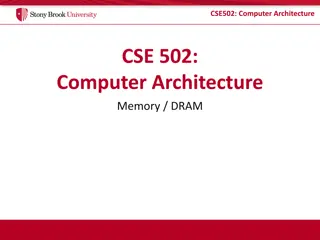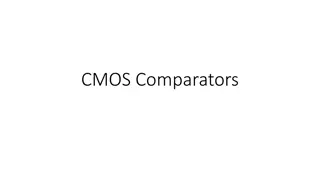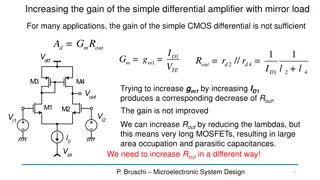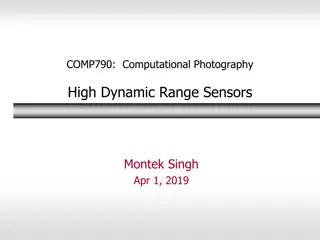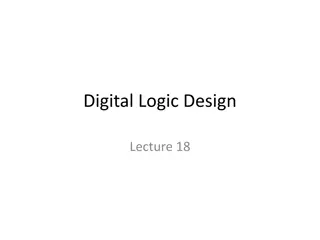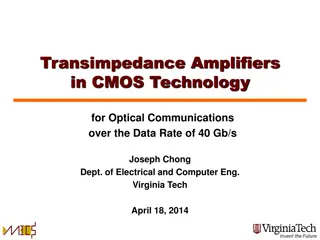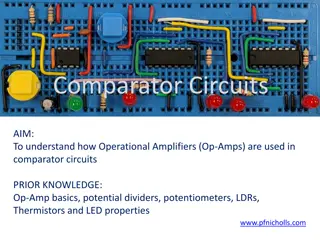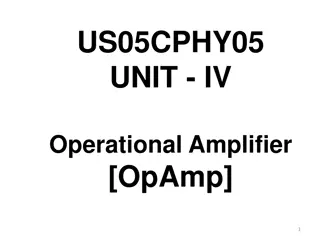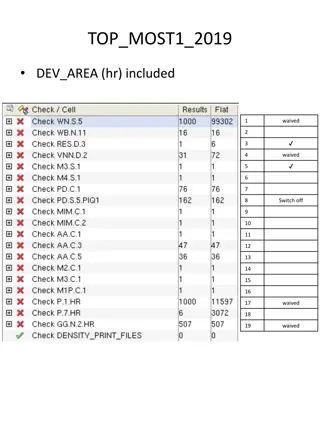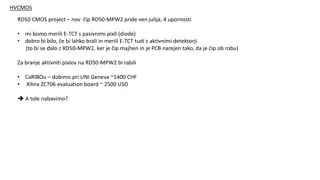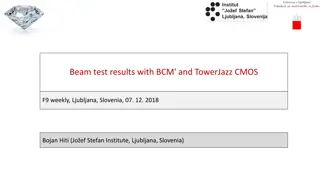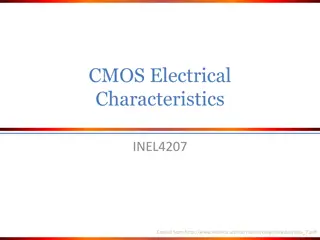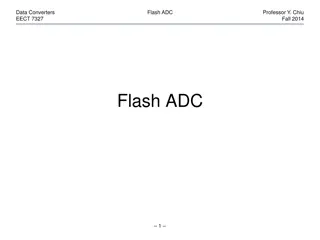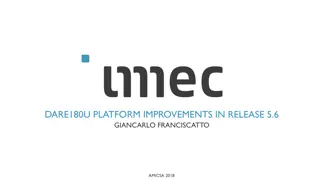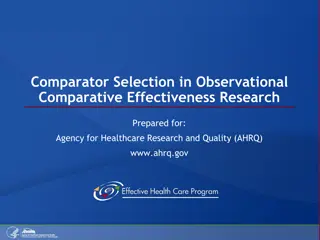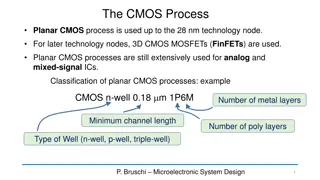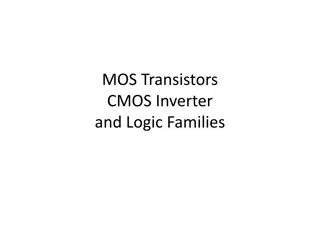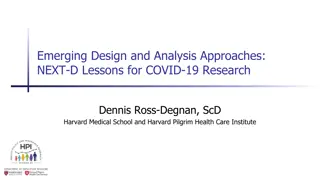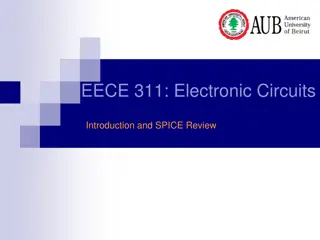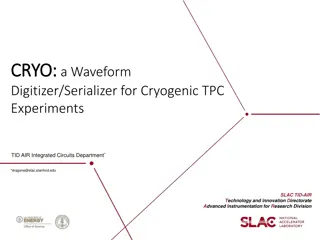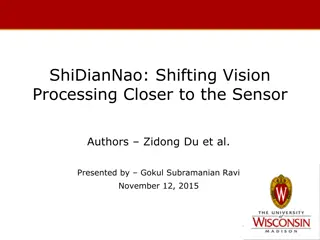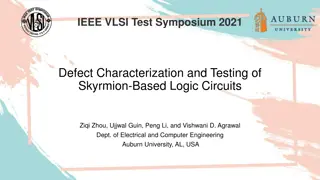Evolution of Digital Radiography in Medical Imaging
Explore the evolution of digital radiography in medical imaging, from the invention of CMOS in 1963 to the development of Gadolinium-based flat-panel detectors in 1997. Learn about the advantages and challenges of digital imaging technology and its impact on the field of radiography.
0 views • 102 slides
Understanding Magnitude Comparators in Digital Circuits
A magnitude comparator is a crucial component in digital circuits used to compare two numbers and determine their relative magnitudes. This comparison involves checking if one number is greater than, less than, or equal to the other. By analyzing the algorithm for equality and inequality, we can gra
7 views • 9 slides
Understanding Mortgage Derivatives and Risk Management
Mortgage derivatives such as Interest Only (IO) and Principal Only (PO) strips, as well as Collateralized Mortgage Obligations (CMOs), offer investors a way to manage risk more precisely than traditional mortgage-backed securities. By allowing control over interest rate and default risks, these soph
0 views • 80 slides
Enhancing Economic Diversification in Central Africa through Leather Production
Leveraging experiences from successful comparators, particularly Ethiopia, this webinar explores skills for economic diversification in Central Africa, focusing on the leather industry. It examines livestock populations, raw hide and skin trading, animal husbandry challenges, raw hide and skin produ
0 views • 19 slides
Computer Architecture: Understanding SRAM and DRAM Memory Technologies
In the field of computer architecture, SRAM and DRAM are two prevalent memory technologies with distinct characteristics. SRAM retains data as long as power is present, while DRAM is dynamic and requires data refreshing. SRAM is built with high-speed CMOS technology, whereas DRAM is more dense and b
3 views • 38 slides
Understanding CMOS Comparators and Dynamic Comparators in Electronics
Explore the world of CMOS comparators and dynamic comparators in electronics, including concepts such as offset cancellation, fully-differential comparators, use of op-amps, speed-up techniques, small-signal models, and the need for RS latch in dynamic comparator circuits. Discover how these compone
0 views • 19 slides
Understanding Integrated Circuit Amplifiers and Design Philosophy
Integrated Circuit (IC) amplifiers are essential components in modern electronics, consisting of miniaturized active and passive devices on a semiconductor substrate. This article explores the building blocks, design philosophy, terminology, device variety, and biasing of ICs, emphasizing the use of
0 views • 11 slides
Techniques to Increase Gain in a Simple Differential Amplifier
Explore methods to boost the gain of a simple CMOS differential amplifier by replacing the current mirror with a cascode mirror, adding a common-gate stage, and employing a cascode differential amplifier. These techniques help improve Rout without extensive use of long MOSFETs, optimizing the amplif
2 views • 30 slides
Pecuniary Penalties for Competition Law Infringements in Australia
Explore the setting of pecuniary penalties for competition law violations in Australia compared to other jurisdictions around the world. The report discusses the drafting process, structure, penalty setting in Australia, international comparators, and recommendations.
0 views • 46 slides
Enhancing Governance and Service Delivery: Insights from PNG Australia Governance Partnership
This presentation discusses the governance landscape in Papua New Guinea (PNG) with a focus on service delivery reform. It covers the methodology, findings, and implications of the PNG Australia Governance Partnership, highlighting key aspects such as country comparators, data collection, and assess
0 views • 20 slides
Understanding High Dynamic Range Sensors in Computational Photography
Dive into the world of High Dynamic Range (HDR) sensors in computational photography with topics covering sensor architectures, CMOS sensing techniques, dynamic range evaluation, and basic concepts related to image sensors and pixel integrators. Explore the importance of dynamic range in capturing a
6 views • 33 slides
Understanding Digital Logic Design Fundamentals
Delve into the intricate world of digital logic design with a focus on components like binary adders, subtracters, and comparators. Explore the concept of scale of integration and learn about MSI components and the realization of full binary adders. Discover how to simplify circuits and grapple with
0 views • 32 slides
Understanding CMOS Layers and Interconnect Design in Semiconductor Manufacturing
This content provides detailed insights into the CMOS layers, n-well process, p-well process, twin-tub process, metal interconnect layers, gate design, and layout strategies involved in semiconductor manufacturing. Explore the images and descriptions to grasp the complexities of MOS arrays, gate con
0 views • 27 slides
Proper Procedure for Using and Shutting Down a Computer
Learn the correct procedure for setting up and starting a computer, including the booting process, CMOS settings, and loading the operating system. Follow the steps to safely shut down your computer to prevent data loss and damage to components.
0 views • 25 slides
Transimpedance Amplifiers in CMOS Technology for Optical Communications at 40 Gb/s
This research by Joseph Chong at Virginia Tech delves into the use of transimpedance amplifiers (TIAs) in CMOS technology for optical communications operating at a data rate of 40 Gb/s. The study outlines the motivation behind the project, the role of TIAs in optical receivers, TIA circuit topologie
0 views • 52 slides
Understanding Operational Amplifier (Op-Amp) Comparator Circuits
Operational Amplifiers (Op-Amps) are commonly used in comparator circuits to convert analog inputs to digital outputs. In comparator circuits, the Non-Inverting input being higher or lower than the Inverting input determines whether the output is ON or OFF. Real comparators like the 741 or 081 have
1 views • 14 slides
Understanding Operational Amplifiers (Op-Amps) and Their Applications
Operational Amplifiers (Op-Amps) are devices used to amplify signals using an external power source. They are composed of transistors, resistors, and capacitors. Op-Amps find applications in summing amplifiers, AC and DC signal processing, digital-to-analog converters, active filters, oscillators, r
1 views • 41 slides
Electronic Design Rule Checking Guidelines
This document provides detailed guidelines for adhering to design rules for electronic components and circuits, covering various aspects such as spacing requirements, potential interactions, and component specifications. It includes rules related to image sensors, pad spacing, VIA density, and the p
1 views • 14 slides
Advanced Technologies for Particle Detection and Monitoring
Cutting-edge technology such as HVCMOS RD50-CMOS project along with CaRIBOu and Xilinx ZC706 evaluation board are being employed for precise measurements in E-TCT with passive and active pixel detectors. The development of Radiation Monitor Sensor Boards for ITk, involving sensors like RadFETs and d
0 views • 6 slides
Navigating the Challenges of C-Level Recruitment Tips for Building a Strong Executive Team
One of the most crucial actions that a business can undertake is the employment of C-level staff. These top executives, including CEOs, CFOs, COOs, and CMOs, have a direct impact on an organization\u2019s strategy, culture, and overall achievement.
0 views • 6 slides
Understanding Modern Non-inferiority Trial Designs in Antibiotic Development
This article discusses the significance of non-inferiority designs in advancing antibiotic development to combat multidrug-resistant bacteria. It emphasizes the importance of distinguishing between UDR, MDR, and XDR bacterial categories in trial design, highlighting challenges in selecting comparato
0 views • 12 slides
Beam Test Results with BCM and TowerJazz CMOS F9 Weekly
Bojan Hiti from Jožef Stefan Institute in Ljubljana, Slovenia conducted a series of tests involving BCM prototype readout chip and TowerJazz CMOS at CERN SPS H6. The experiments included beam tracking, analog readout, and chip configurations for the ATLAS Beam Condition Monitor upgrade. Detailed re
0 views • 19 slides
Understanding CMOS Electrical Characteristics for INEL4207
This document delves into the electrical characteristics of CMOS technology, covering topics such as power-delay product, latch-up, hot carriers, electromigration, sheet resistance, and parasitic capacitance. It provides valuable insights into the performance and behavior of CMOS circuits.
0 views • 13 slides
Understanding Flash ADC Architecture and Challenges
Explore the Flash ADC architecture designed by Professor Y. Chiu in Fall 2014, including the Vi reference ladder, thermometer code implementation, and typical CMOS comparators. Learn about the challenges faced in Flash ADC design, such as VFS specifications, comparator requirements, and resolution c
0 views • 36 slides
DARE180U Platform Enhancements in Release 5.6 - AMICSA 2018
The DARE180U platform introduces radiation-hardened ASIC design capabilities on UMC 0.18μm CMOS technology for space and high-energy physics applications. Supported by ESA and featuring ITAR-free components, it offers libraries, IP, and design services for front-end and back-end design flow. The pl
0 views • 19 slides
Understanding and Implementing Hysteresis in Comparator Circuits
Comparator circuits with hysteresis play a crucial role in signal processing applications. This article explores the theory behind comparator functions, hysteresis adjustment, and practical implementation using the TLV1701-Q1 series. Learn how to set up non-inverting and inverting comparators with h
0 views • 7 slides
FPGA Data Converter Interfacing Overview
Explore various I/O formats for interfacing data converters with FPGAs, including ADC parallel and serial formats like CMOS, LVDS, DDR. Learn about clock edge alignment, parallel, and true serial formats. Understand the differences between SDR and DDR, as well as considerations for clocking and data
0 views • 32 slides
Recap of Capital Requirement Compliance by CMOs
Implementation of new minimum capital requirements by Securities & Exchange Commission involved various initiatives before the deadline. Post-deadline analysis revealed a 72% compliance rate among CMOs. The Provisional List detailed compliance levels across different functions and categories. Notewo
0 views • 8 slides
Guide to Comparator Selection in Comparative Effectiveness Research
Proper selection of comparators is crucial in comparative effectiveness research to ensure the validity and clinical relevance of study results. This process involves choosing concurrent, active comparators from the same population, addressing potential biases, defining time zero for all comparator
0 views • 15 slides
Overview of CMOS Process in Microelectronic Design
The CMOS process involves both planar and 3D CMOS technologies for different technology nodes. Planar CMOS processes, like CMOS n-well 0.18μm 1P6M, are still widely used for analog and mixed-signal ICs. This process includes steps like creating active areas, depositing polysilicon and gate oxide fo
0 views • 15 slides
Next Version Development for AlphaRad4 Sensor Front-End
In this project, the goal is to create the next version of the AlphaRad4 sensor front-end system by modifying the AlphaRad3 front-end to work with the sensors from AlphaRad4. The project involves various functional and electrical specifications, including gain ranges, comparators, counters, and diff
0 views • 18 slides
EagleSat.2 Cosmic Ray Payload (CRP) Overview
EagleSat.2 is a space mission designed to detect incoming cosmic ray particles and determine their direction and magnitude. The mission utilizes CMOS sensors and tungsten layers to capture data and estimate energy loss. Operational logistics include cycling sensors per orbit to manage power and data
0 views • 31 slides
Understanding NMOS Transistors in CMOS Logic Circuits
Explore the operation of NMOS transistors in CMOS logic circuits, learn about doping silicon for semi-conductance, and discover how gate voltages affect the behavior of NMOS transistors at different levels of activation. Dive into the intricacies of MOS transistors, CMOS inverters, and logic familie
0 views • 20 slides
Emerging Design and Analysis Approaches in COVID-19 Research
Dennis Ross-Degnan from Harvard Medical School discusses the NEXT-D lessons for COVID-19 research, focusing on study design, bias reduction, data metrics, and the value of long-term research consortia like NEXT-D. The content covers interventions, comparators, observational study design issues, and
0 views • 11 slides
Electronic Circuits Introduction and SPICE Review Course Information
This course, EECE 311, provides an in-depth exploration of electronic circuits, covering topics such as BJT and MOSFET amplifiers, feedback systems, operational amplifiers, oscillators, and digital CMOS circuits. Students will gain knowledge on amplifier characteristics, frequency response, and the
0 views • 8 slides
SLAC CRYO: Waveform Digitizer/Serializer for Cryogenic TPC Experiments
SLAC is developing the CRYO ASIC, a high-performance waveform digitizer and serializer optimized for cryogenic operation in experiments like DUNE. The CRYO ASIC offers advanced features such as single-chip integration, programmability, on-chip regulation, and design for reliability. Operating in a 1
0 views • 23 slides
ShiDianNao: Advancing Vision Processing Closer to Sensors
Neural network accelerators are achieving high energy efficiency and performance for recognition and mining applications. To overcome memory bandwidth constraints, the proposal suggests mapping the entire CNN into SRAM and moving closer to sensors to minimize memory access for I/O. Placing the CNN a
0 views • 24 slides
Defect Characterization and Testing of Skyrmion-Based Logic Circuits at IEEE VLSI Test Symposium 2021
With CMOS devices nearing quantum-mechanical limits, magnetic skyrmions offer a promising solution for next-generation spintronic logic devices and memories. This presentation at the IEEE VLSI Test Symposium 2021 delves into defect characterization and testing of skyrmion-based logic circuits. It co
0 views • 19 slides




